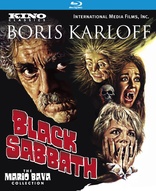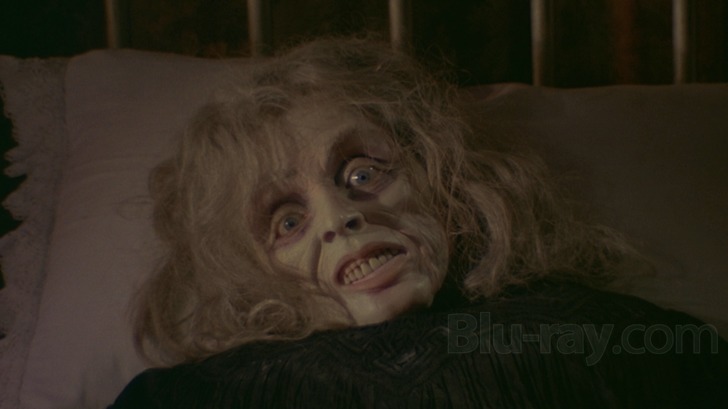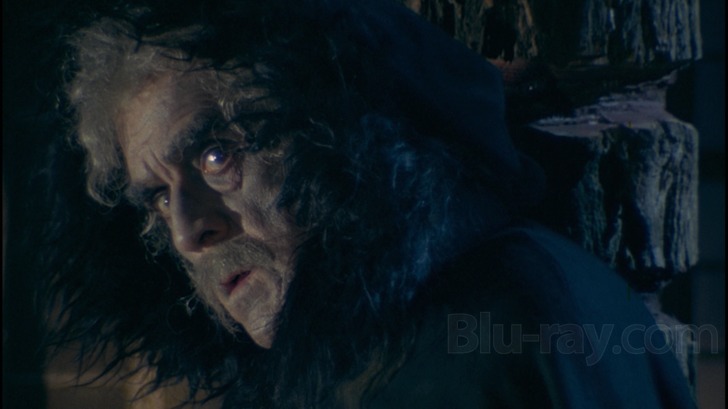Black Sabbath Blu-ray Movie
HomeBlack Sabbath Blu-ray Movie 
I tre volti della pauraKino Lorber | 1963 | 92 min | Not rated | Jul 16, 2013

Movie rating
7.2 | / 10 |
Blu-ray rating
| Users | 2.0 | |
| Reviewer | 3.5 | |
| Overall | 3.3 |
Overview
Black Sabbath (1963)
A trio of atmospheric horror tales about: A woman terrorized in her apartment by phone calls from an escaped prisoner from her past; a Russian count in the early 1800's who stumbles upon a family in the countryside trying to destroy a particularly vicious line of vampires; and a 1900-era nurse who makes a fateful decision while preparing the corpse of one of her patients - an elderly medium who died during a seance...
Starring: Michèle Mercier, Boris Karloff, Mark Damon, Harriet Medin, Lidia AlfonsiDirector: Mario Bava
| Horror | Uncertain |
| Foreign | Uncertain |
Specifications
Video
Video codec: MPEG-4 AVC
Video resolution: 1080p
Aspect ratio: 1.77:1
Original aspect ratio: 1.85:1
Audio
Italian: LPCM Mono
Subtitles
English
Discs
25GB Blu-ray Disc
Single disc (1 BD)
Playback
Region A (B, C untested)
Review
Rating summary
| Movie | 4.0 | |
| Video | 3.5 | |
| Audio | 3.5 | |
| Extras | 0.5 | |
| Overall | 3.5 |
Black Sabbath Blu-ray Movie Review
Bava's Triumvirate of Terror
Reviewed by Casey Broadwater July 1, 2013In 1963, the same year that he practically invented the giallo single-handedly with The Girl Who Knew Too Much, director Mario Bava also made the eerie anthology horror movie I tre volti della paura, a.k.a. The Three Faces of Fear, a.k.a. Black Sabbath. (Yes, this is the film that gave Black Sabbath—the band—their name.) Bava long considered it his favorite of his own films, and that's a sentiment that's easy to share. It has a little bit of everything—the gothic atmosphere of his solo directorial debut, Black Sunday, the lurid cinematography of his later proto-slasher movies, and three memorably creepy stories drawn from classic literature. Horror anthologies have a tendency to be hit-or-miss, but each vignette here is successfully unsettling in its own way, building to a cumulative feeling of pants-wetting terror by the final short, which features what might be the scariest mannequin ever captured on film. The screenshot below doesn't even begin to do it justice.

An ancient and wild-looking Boris Karloff—who is featured in the second segment—introduces the film atop a horse, promising "tales of terror and the supernatural." The first short, The Telephone, is most definitely in the nascent giallo mode. The incomparably beautiful French actress Michèle Mercier (Angélique, Marquise des Anges) plays Rosy, a high-class escort returning home from an evening out. As she gets ready for bed— dressed in only a bathrobe—she gets a series of threatening phone calls. At first, there's only silence on the other end, but soon the anonymous caller is letting on that he's nearby, watching her inside the house, and telling her, "I want to kill you. I want revenge. I want too see you die." Rosy surmises that the man on the end of the line is her former pimp, Robert—who has recently escaped from the prison her testimony put him in—but instead of calling the cops like a sane person, she pours herself some Johnny Walker Red Label, phones her estranged lesbian lover, Mary (Lydia Alfonsi), and has her come over for security. To detail what happens next would inevitably get into heavy spoiler territory, but let's just say it involves a nylon stocking, a butcher's knife, and at least two unexpected surprises. The Telephone is tense and stylish, and as one of the first Italian thrillers shot in color, it undoubtedly had an influence on the look of the new giallo sub-genre.
In contrast, the second short, The Wurdalek—based on a novella by Tolstoy—draws its visual cues from horror cinema's past. Imagine a Universal monster movie from the 1930s remade in color and that'll get you close. Lots of fog and torchlight. Period costumes. Elaborate indoor sets with spindly trees and stone hovels. The setting is 19th century Eastern Europe, in the dead of winter. Handsome young Count Vladimir d'Urfé (Mark Damon) is journeying across the slavic countryside when he comes across a headless body stabbed in the back with an ornate dagger. He takes the blade as a souvenir, and while passing through the next village, he spots a set of identical knives in the home of the peasant Giorgio (Glauco Onorato), who lives there with his wife (Rika Dialina), his young son Ivan, his brother (Massimo Righi), his sister (Susy Andersen), and his father, Gorcha (Boris Karloff). Giorgio explains that Gorcha went off with the dagger to hunt an infamous wurdalek, a type of vampire—in a welcome twist on the usual mythos—that feeds specifically on the blood of those it loves most. (If you're thinking that Gorcha's family is in grave danger, you're absolutely right.) The old man told his children that if he returned after midnight, it would mean that he had been "turned"—and to kill him immediately by stabbing him through the heart—but when he shuffles up to the door a few seconds past twelve, they let him in anyway, glad to have him home. Bad idea. Death quickly follows, and The Wurdalek taps into that I love you, and can't bring myself to kill you before you kill me dilemma that has rooted just about every zombie film since Night of the Living Dead. Boris Karloff is great as the increasingly deranged Gorcha—though he's dubbed in Italian—but what you'll remember most is the little dead vampire boy outside his mother's bedroom window, shouting, "Mama, I'm cold! Mama, I'm cold!" Chills, man, the chills.
If The Wurdalek gives you goosebumps, the final segment, The Drop of Water, will have you nope nope nope-ing right out of the room. Jacqueline Pierreux plays Nurse Chester, who has been summoned to a decrepit Miss Havisham-style mansion to prepare the body of an old spinster medium who died of a heart attack during one of her weekly Friday night seances. Already we're in creepsville, but then we see the dead elderly woman's face— frozen in a horrific expression of curled, menacing terror. The woman is obviously "played" by a prop dummy, but she's deep in the uncanny valley, looking human-but-not-quite-human and, therefore, absolutely terrifying. While changing the medium's clothes, Nurse Chester sees the chance to steal a large gemstone ring off of her finger, and when she returns home—her flat is vividly lit by the neon lights of London's East End—she's haunted by the sounds of a buzzing fly, dripping water, and finally, the specter of the dead medium, moving towards her stiff as a board. It's one of the most arresting images you'll find in a 1960s horror film, and it would be the perfect end-cap for one of the better horror anthologies ever made. I say would because it doesn't quite end there; Boris Karloff shows up one more time in a hokey joke of an epilogue to remind us all that what we've seen is only movie magic.
Black Sabbath Blu-ray Movie, Video Quality 

Kino's 1080p/AVC-encoded presentation of Black Sabbath is sourced from the same raw transfer that Arrow Video used for their U.K. release of the film; however, Arrow went on to perform some additional digital cleanup, while Kino basically left the print "as is." (Kino also stuck with only the Italian cut, whereas Arrow's release includes both the Italian and English versions.) Thankfully, there's no significant print damage here, only the usual—occasional white specks, light scratches, and bits of hair stuck in the edges of the frame. If you've seen the film on DVD before, you'll notice an immediate and substantial improvement. Grain is present throughout—there are no noise reduction abuses here—and the image has a very natural, filmic look, untouched by edge enhancement or other types of filtering. The image is a little soft, on the whole—I suspect this goes back to the source materials and not some shortcoming in the digitization process—but clarity is far better here than it ever has been on home video. The film's distinct and evolving color palette looks great too, from the elegant tones of The Telephone to the cold blues of The Wurdalek and the flashing neon purples and greens of The Drop of Water. There are some brief color and brightness fluctuations, but otherwise the picture is very stable, with good contrast and saturation. The Arrow Video release seems a bit more vivid—perhaps punched up a bit during the restoration process—but Kino's is at least true to source.
Black Sabbath Blu-ray Movie, Audio Quality 

The film's uncompressed Linear PCM 2.0 mono track also has some slight age damage—a low, occasionally audible hiss, some random pops and crackles —but nothing particularly distracting, especially if you're used to watching low-budget 1960s horror. This is the Italian cut of the film, so it includes a brassy, moody score by Roberto Nicolosi—the U.S. version was scored by Les Baxter—and the music sounds great, particularly over the opening credits. The dubbing is surprisingly decent too, and the dialogue is always clear and balanced in the mix, with no peaking or muffling. The disc includes optional English subtitles, which appear in easy-to-read white lettering.
Black Sabbath Blu-ray Movie, Special Features and Extras 

Unfortunately, in the supplementary department, Kino's Blu-ray release just doesn't compare to Arrow Video's U.K. collection, which includes both the Italian and international cuts of the film, a commentary track, several featurettes, a 40-page booklet, and more. The only extras here are trailers for Bava's Black Sunday, Hatchet for the Honeymoon, Baron Blood, Lisa and the Devil, and The House of Exorcism.
Black Sabbath Blu-ray Movie, Overall Score and Recommendation 

Mario Bava's Black Sabbath—or, The Three Faces of Fear, as it's more appropriately known—is one of the better horror anthologies, all terrifying hits and no misses. The Telephone is a perfectly condensed giallo, The Wurdalek broods with Gothic horror unease, and The Drop of Water features a prop dummy so terrifying it made me shudder in my seat while I was taking screenshots of the film with the sound off. (It's even scarier with the audio on.) Kino's bare-boned Blu-ray release isn't quite up to the same level of quality set by Arrow Video's Region- B-locked U.K. set—which has been digitally restored, includes two cuts of the film, and comes with lots of extras—but unless you've got a region-free player, this disc is definitely the best way to see the film. Recommended for all fans of classic 1960s horror!
Other editions
Black Sabbath: Other Editions

Black Sabbath
I tre volti della paura / International Version
1963

Black Sabbath
AIP Cut | 60th Anniversary
1963

Black Sabbath
AIP Cut
1963
Similar titles
Similar titles you might also like

Black Sunday 4K
The Mask of Satan / La maschera del demonio 4K
1960

Baron Blood
Gli orrori del castello di Norimberga
1972

Kill, Baby... Kill!
Operazione paura
1966

Lisa and the Devil
Lisa e il Diavolo / The House of Exorcism
1973

The House by the Cemetery 4K
Quella villa accanto al cimitero
1981

Lust of the Vampire
I vampiri
1957

The Beyond 4K
...E tu vivrai nel terrore! L'aldilà / Seven Doors of Death | Standard Edition
1981

The Vampire Doll
Chi o suu ningyô
1970

Tales of Halloween
2015

The Vampire Lovers
Collector's Edition
1970

Tombs of the Blind Dead
La noche del terror ciego | Standard Edition
1972

A Bay of Blood
Reazione a catena
1971

The Night of the Devils
La notte dei diavoli
1972

Pyewacket
2018

Anthropophagous
1980

Cat in the Brain
Un gatto nel cervello | Glow in the Dark Cover & Mini Portrait of Lucio Fulci Limited Edition to 3000
1990

Rigor Mortis
殭屍
2013

Evil Eye
Featuring The Girl Who Knew Too Much / La ragazza che sapeva troppo
1963

Django, Kill... If You Live, Shoot!
Se sei vivo spara
1967

Gonjiam: Haunted Asylum
곤지암
2018